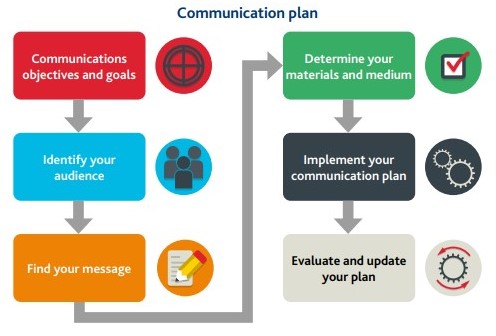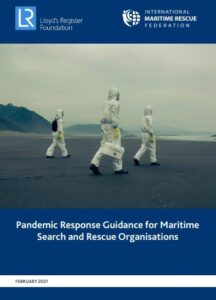With the support of Lloyd’s Register Foundation, the IMRF has developed Pandemic Response Guidance for Maritime Search and Rescue (SAR) Organisations that can be used as the basis for planning and delivering maritime SAR services in future pandemics or major health emergencies.
Priorities for SAR organisations during a global pandemic
The key priorities for all SAR organisations during pandemics are:
- Minimise the risk of infection for all personnel.
- Continue to provide effective SAR and lifesaving services.
- Minimise the risk of infection for those who come into contact with the SAR service.
In a fast-moving situation, the delivery of accurate, clear and up-to-date information and advice is an important factor in the delivery of a safe and effective maritime SAR service during a pandemic.
Organisations need to have a robust communication strategy in place to ensure that information gets to the right people at the right time.
The information provided should be factual, timely and targeted. It should support personnel in carrying out their work safely and effectively.

Essential SAR activities
Maintaining essential SAR services should be the priority and the organisation should provide all operating bases with detailed instructions on how to proceed with SAR operations during the pandemic.
Examples may include:
- SAR tasks received from the Maritime Rescue Co-ordination Centre (MRCC).
- Giving assistance to a vessel in distress.
- Medevac, transportation of casualties, or people who are sick (whether related to the pandemic or not).
- Where national or local travel restrictions are in place, the organisation should liaise with the relevant national authorities to ensure that duty personnel, who are responding to an incident at the request of the relevant competent authority, can obtain the necessary authorisations to enable them to travel to their operational base.
Minimising the risks to personnel during essential SAR activities
Where it is necessary to undertake a particular SAR activity, it is important to consider who really needs to participate in the activity and what safeguards can be put in place to protect everyone involved.
- Only the minimum essential personnel should participate in the activity. That must include personnel with the normal mandatory qualifications and certification (e.g. coxswain/skipper, engineer, radio navigation, deck crew, first aid etc.).
- The crew involved should be part of the duty crew.
- Participants should not attend if they have any symptoms of the infection, are feeling unwell or have tested positive for the infection.
- If possible, personnel should not belong to any of the identified high-risk groups as they could be more susceptible to the disease (e.g. medical status, or otherwise).
- All stand-by personnel should be given prior instructions for safe access to their operating base, including parking, changing facilities etc. or be provided a dedicated personnel briefing before going on board. This should emphasise protective measures, including personnel placement on board (wheelhouse or outdoor deck), use of personal protective equipment etc.
Non-essential visits
All non-essential visits to operating bases or organisation headquarters should be suspended during the pandemic, including visits from personnel not on call, members of cooperating organisations or authorities, sponsors etc. This should be communicated clearly on websites, social media etc. If the situation is prolonged for several years, new
revised procedures may need to be put in place to adapt to any new regulations.
In addition, all physical presence at operating bases and other organisation buildings should be kept to a minimum. If possible, only personnel required for essential maintenance, or critical to the conduct of safe and effective operations should be allowed physical access. Poster reminders on how to wash hands correctly should be displayed around the building, particularly in washrooms. All personnel who are physically present should take responsibility to help wipe down high transit areas on the SAR unit and in buildings such as table surfaces, cupboard doors, door handles etc.
Training activities
During the containment phase of the pandemic, all non-essential training activities that require participants to be physically present should be suspended, cancelled or postponed. This is to avoid contact between operating bases and communities, as well as between personnel in a specific operating base.
Essential training activities that cannot be postponed should be carried out with the minimum number of trainers and trainees in attendance. If possible, such training should be organised for personnel from one operating base at a time.
In general terms, essential training is training that is needed for the continued provision of safe and effective rescue operations during a pandemic.
Examples of essential training include:
- Familiarisation with a new SAR unit, new equipment or new way of operation.
- Familiarisation with the SAR unit and operating procedures for replacement personnel (where regular personnel are off sick or in quarantine).
- Training with helicopter crews to support them in maintaining essential aeronautic operational qualifications.
Wellbeing
During a pandemic, the welfare of all personnel is critically important. Those that have leadership responsibilities can play a crucial role in ensuring the physical and emotional welfare of their team.
If personnel are facing long periods of isolation, due to lockdown measures or periods of quarantine, this can have an impact on their wellbeing and mental health. It is really important to ensure personnel are staying in regular contact either by phone or online platforms. Ensure regular daily or weekly welfare checks are carried out on anybody who
is in self isolation.
If personnel are involved in any traumatic incidents, you should be vigilant that procedures are followed to ensure those personnel are able to discuss the incident and to access support and counselling.
Personnel should have an awareness of the signs and symptoms of stress, post-traumatic stress (PTS) and post-traumatic stress disorder (PTSD).
Both stress and PTS should be taken seriously, rather than ignored, and appropriate advice should always be sought.
































































